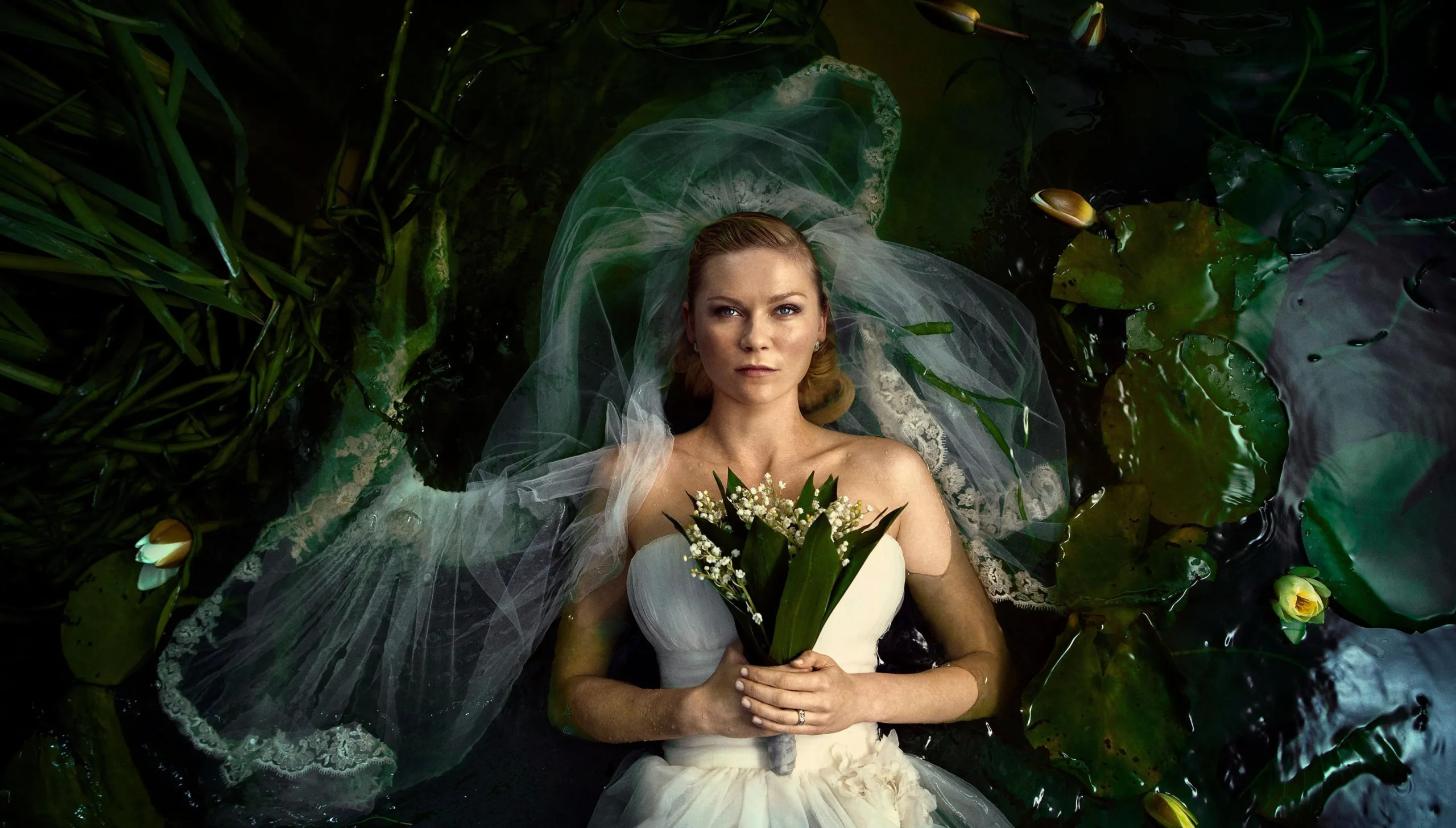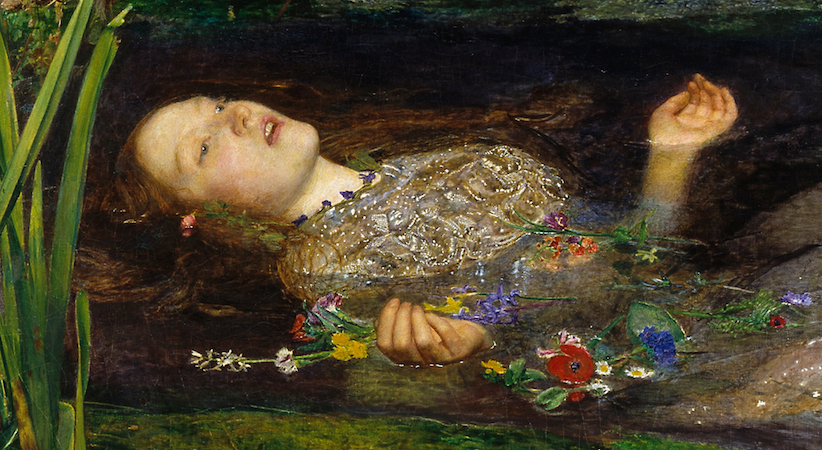By Vasiliki Tsekoura,
Ophelia is known by many as the poor, pitiful girl who meets her tragic death by drowning. Ophelia is characterised as a young, beautiful girl who is completely obedient. During the time that the play is set, these qualifications would enable her a happy marriage, however, that is far from the truth as she is trapped in the one-sided love she has for Hamlet.
Ophelia symbolises femininity, innocence and virtue while also being childish and naïve. Due to her mother’s passing, whose cause is unknown but many speculate it was during her birth, she doesn’t know about the harsh reality of life. Despite her love for Hamlet being so strong she remains loyal to her brother and father and obeys their orders. Even if she’s innocent and virtuous Hamlet disdained her because in his mind women pretended to be pure and innocent since they were driven by desire.
She is an important character in Hamlet due to her femininity and because she plays a significant role in him expressing the aggression that is caused by his mother meaning that the relationship they have, could be characterised as complex.
Ophelia as an object with no purpose
Ophelia is objectified by the three men. Laertes uses her so as to act out his patriarchal duties. Polonius uses her to improve his social status and Hamlet treats Ophelia in two ways. He thinks of her as a woman of beauty who deserves nothing but the best but also regards her as an object who is only there to satisfy his desires.
Ophelia tells her father about her first interaction with Hamlet, how he came into her closet when she was sewing. Even though Hamlet does not address her in this scene, it is noticeable by his actions that he has been in her room before. He knew where her room was and knew about her daily routines. His actions call attention to their relationship with her as it is open and honest. After meeting his father’s ghost, Hamlet goes to Ophelia in the most vulnerable state, leaving her with a cryptic message. Ophelia is unable to understand Hamlet’s intentions since she has no experience, while also not knowing what to believe. When he sent her the love letter, he had written for her, she easily misunderstood him. Her father decides to read out-loud the letter while also criticising it and Hamlet’s ways of secretly informing her of his love for her. Hamlet, because of his paranoia, he seeks Ophelia to tell her that she should not lose her faith in his love. Unfortunately, she loses faith in him and that’s because of the fact that she has no right to speak, think and act as she was told to “speak when spoken to, act when addressed”.
Hamlet addresses Ophelia as an angel and a woman to admire, to him she’s the best of all, cancelling the thought of her being insignificant. However, there is a change in his attitude regarding her as an object that is there to satisfy his needs.

When her father makes her meet Hamlet, she completely obeys her father’s commands to, return the letters to Hamlet. She says to him “My lord, I have remembrances of yours, that I have longed long to redeliver. I pray you now receive them.” And begs him to take back the letters. Hamlet, however, denies ever sending her letters and questions “Are you honest?”. This could be interpreted in two ways. It’s the ability to tell the truth and a female’s virginity as in the epithet “honest woman”. Hamlet also asks her if she is fair implying if she is equal or true and beautiful, meaning that he comments on Ophelia’s beauty and her ability to be truthful and constant. This question is also checking if Ophelia is on Hamlet’s side. However, due to her innocent nature and inexperience in deception, she does not understand the trap he had set her. In short, in Hamlet’s eyes, Ophelia is an angel, a woman of beauty, obedient and an object that exists to fulfil his needs.
Ophelia’s sanity
Many critics describe Ophelia as a minor character with no development who only serves the purpose in the development of Hamlet’s character. Yet, when analysing Ophelia, one discovers that Ophelia is a complex character with depth. Ophelia is obedient and silent throughout the play however she has her moments where she shows power. When Laertes demands her to share her activities with him, she questions him; Ophelia questions his faith in her, her obedience and her loyalty to him. In another moment, where Ophelia listens to her brother silently going on about her protecting her virtue from Prince Hamlet, she tells him “I shall the effect of this good lesson keep As watchman to my heart. But, good my brother, Do not, as some ungracious pastors do, Show me the steep and thorny way to heaven”. With that she tells Laertes that she will keep in mind his advice however he should stop acting in a hypocritical way. This interaction shows that even though many know Ophelia as the obedient sister and daughter, she wants to be their equal when it comes to being morally correct.
The insane Ophelia
Ophelia starts losing her mind after the death of her father and the absence of Hamlet drives her to insanity. Ophelia gains the ability to speak, think and act which she used to express only in Hamlet’s presence. Queen Gertrude is the first to notice the change in Ophelia and even though she refuses to meet her at first, she changes her mind. Ophelia tells the queen that she is “the beauteous majesty of Denmark” something that derives from Hamlet’s letter where he claimed she was “beautified”. Ophelia here uses sarcasm to mock the Queen’s narcissism. When the Queen decides to talk to her, she begins to sing “How should I your true love know From another one? By his cockle hat and staff, And his sandal shoon” which foretells the sadness that will meet her. This song references King Hamlet’s death, who was murdered by Claudius. When Ophelia asks the Queen “How should I your true love know/ From another one?” she questions who her true love is. Ophelia continues to tell the truth about the King’s death with a message “White his shroud as the mountain snow,–”. White is known to symbolize innocence and purity and the shroud symbolizes the dress in his funeral, meaning that King Hamlet died an innocent man.
When King Claudius enters Ophelia does not refer to him as a Lord but as a known face. She now is an independent soul, doing whatever she wants. She tells to King Claudius “Well, God reward you!… God be at your table!” implying that he will get what he deserves by God for killing King Hamlet and for plotting against Hamlet.

Ophelia meets her end
Ophelia was one-dimensional and even though she could become a heroine, she succumbs to madness. Through Ophelia, one can witness Hamlet’s de-evolution where he exclaims that all women were corrupted and only acted pure for their sexual desires. Ophelia has been made a prostitute by her father, as he uses her to find out why Hamlet is behaving in such a peculiar way.
Ophelia represents goodness, innocence and purity like Queen Gertrude. However, Ophelia has a reason to behave in such ways without knowing what reality is, unlike the Queen.
Hamlet causes a lot of emotional pain to Ophelia and when his hate is the cause for her father’s death, she goes insane. Despite her insanity she regards everyone but Hamlet with incorruption and virtue. However, she clings to the memories of Hamlet treating her with respect and love.
The songs that she sings in front of her brother, the Queen and Claudius are reminders of the corrupted world that darkened Ophelia’s pure soul while also mirroring that only her insanity lives up to Hamlet’s false perception of a lustful woman before meeting her death.




